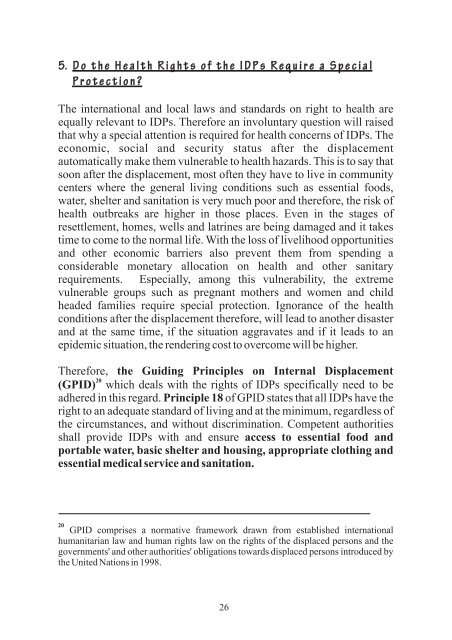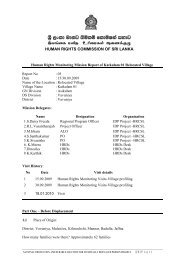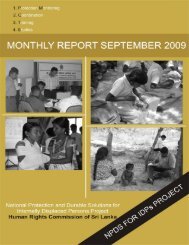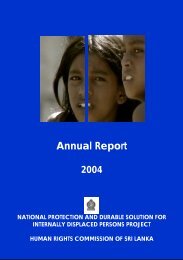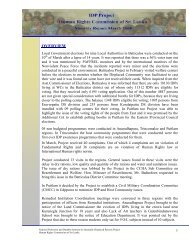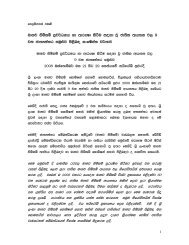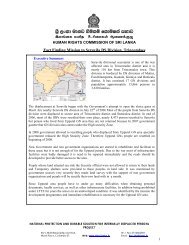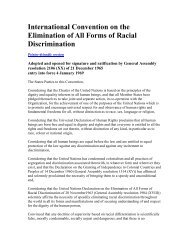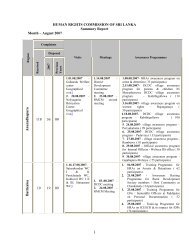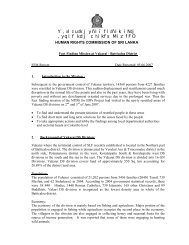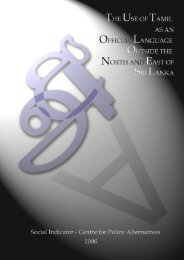Right to Health of Internally Displaced Persons - IDP SriLanka
Right to Health of Internally Displaced Persons - IDP SriLanka
Right to Health of Internally Displaced Persons - IDP SriLanka
Create successful ePaper yourself
Turn your PDF publications into a flip-book with our unique Google optimized e-Paper software.
5. Do the <strong>Health</strong> <strong>Right</strong>s <strong>of</strong> the <strong>IDP</strong>s Require e a Special<br />
Protection?<br />
t o The international and local laws and standards on right <strong>to</strong> health are<br />
equally relevant <strong>to</strong> <strong>IDP</strong>s. Therefore an involuntary question will raised<br />
that why a special attention is required for health concerns <strong>of</strong> <strong>IDP</strong>s. The<br />
economic, social and security status after the displacement<br />
au<strong>to</strong>matically make them vulnerable <strong>to</strong> health hazards. This is <strong>to</strong> say that<br />
soon after the displacement, most <strong>of</strong>ten they have <strong>to</strong> live in community<br />
centers where the general living conditions such as essential foods,<br />
water, shelter and sanitation is very much poor and therefore, the risk <strong>of</strong><br />
health outbreaks are higher in those places. Even in the stages <strong>of</strong><br />
resettlement, homes, wells and latrines are being damaged and it takes<br />
time <strong>to</strong> come <strong>to</strong> the normal life. With the loss <strong>of</strong> livelihood opportunities<br />
and other economic barriers also prevent them from spending a<br />
considerable monetary allocation on health and other sanitary<br />
requirements. Especially, among this vulnerability, the extreme<br />
vulnerable groups such as pregnant mothers and women and child<br />
headed families require special protection. Ignorance <strong>of</strong> the health<br />
conditions after the displacement therefore, will lead <strong>to</strong> another disaster<br />
and at the same time, if the situation aggravates and if it leads <strong>to</strong> an<br />
epidemic situation, the rendering cost <strong>to</strong> overcome will be higher.<br />
Therefore, the Guiding Principles on Internal Displacement<br />
20<br />
(GPID) which deals with the rights <strong>of</strong> <strong>IDP</strong>s specifically need <strong>to</strong> be<br />
adhered in this regard. Principle 18 <strong>of</strong> GPID states that all <strong>IDP</strong>s have the<br />
right <strong>to</strong> an adequate standard <strong>of</strong> living and at the minimum, regardless <strong>of</strong><br />
the circumstances, and without discrimination. Competent authorities<br />
shall provide <strong>IDP</strong>s with and ensure access <strong>to</strong> essential food and<br />
portable water, basic shelter and housing, appropriate clothing and<br />
essential medical service and sanitation.<br />
20<br />
GPID comprises a normative framework drawn from established international<br />
humanitarian law and human rights law on the rights <strong>of</strong> the displaced persons and the<br />
governments' and other authorities' obligations <strong>to</strong>wards displaced persons introduced by<br />
the United Nations in 1998.<br />
26


